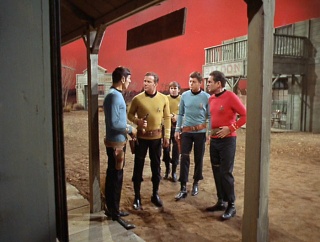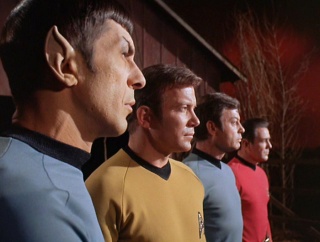Although the third season of Star Trek will probably never match the greatness of the first and second season, there are some notable episodes worth mentioning. One particular episode that has always fascinated me is "The Spectre of the Gun" for its intriguing storyline and strange and surrealistic set design.
Watching the episode recently, I could not help noticing that the ending sequence has a strong connection to the premise of the Wachowski's film, The Matrix (1999). It is well known that part of The Matrix's origin is strongly linked to Jean Baudrillard's Simulacrum and Simulation. But I would like to make the case that there may be another theoretical source
overlooked by critics and fans of The Matrix: Rene Descartes’ cogito (I think, therefore I am”). I would suggest The
Matrix stresses the importance of the universal in Neo’s awaken. It is his
encounter with the universal where Neo discovers he is the chosen one.
Kirk and crew discover that they are to play the characters of the Claiborne gang and to re-enact the legendary showdown with Wyatt Earp and his posse at the OK Corrall in 1861. The twist is that they are the cowboys to be shot. Worse, the showdown will occur at 5pm that day, leaving Kirk and crew a short amount of time to plan an escape.
When Kirk and crew try to exit the town, they quickly realize it is surrounded by a force field. Things become even more troublesome when Chekov is unexpectedly shot by Morgan Earp for pursuing one of his women.
McCoy, Spock and Scotty create a tranquilizer grenade to use as a weapon on Earp and his crew. But when testing the grenade on Scotty, they discover it is ineffective
As 5:00 p.m. nears, a storm begins to brew as Kirk and crew begin to realize the certainty of their fate.
BUT... Spock discovers that Chekov (who is suppose to be playing William Claiborne) survived the battle at OK Corrall. So how can Chekov be dead when history states that he survived? Spock figures out that the reason why they cannot escape their situation at hand is that they believe they exist in a true reality. That is, Kirk and crew believe that the OK Corrall is real.
Kirk and crew have been pitted against the Cartesian cogito and the demon hypothesis. Descartes’ conception of the cogito was to build a ground for the science of knowledge. Descartes argues that if I am deceived by what I think is real in the world (say this blog I am typing or my hands that touch the keypad), I can be certain of one thing—that fact that I think, I therefore must exist.
For Descartes, even if he is deceived by the demon who tells him 2+2=5,
the fact that Descartes thinks, he must therefore exist—even if he doubts the
demon who suggests a universal truth such as 2+2=4 to be false.
The demon hypothesis is exactly what Kirk, McCoy, Spock and Scotty must face - they must convince themselves that OK Corrall is not reality, therefore the bullets will not harm them. As Spock plainly puts it: "Physical reality is consistent with universal laws. When the laws do not operate, there is no reality." They have to be certain in their thoughts to defeat Wyatt Earp and his crew. But even the smallest doubt will kill them!
The demon hypothesis is exactly what Kirk, McCoy, Spock and Scotty must face - they must convince themselves that OK Corrall is not reality, therefore the bullets will not harm them. As Spock plainly puts it: "Physical reality is consistent with universal laws. When the laws do not operate, there is no reality." They have to be certain in their thoughts to defeat Wyatt Earp and his crew. But even the smallest doubt will kill them!
Of course this does not sit well with McCoy because as humans we are always faced with doubt. As McCoy sharply tells Spock, "We're just human beings, Spock. We don't have that clockwork ticker in our head like you do. We can't just turn it on and off!" To avoid any trace of doubt, Spock performs the Vulcan mind meld to put them all in a state of oneness.
Now compare Spock's plan of certainty at the OK Corrall and the climax of The Matrix where Neo realizes that he is the one, and how he is able to control reality--to stop the bullets from impacting him. Also, notice Neo's drop kicking Agent Smith is very similar to Kirk's drop kicking Wyatt Earp!
As I have mentioned, it is well documented that The Matrix is influenced by Baudrillard's order of the simulacrum, which describes a world of signifiers divorced from their referent or origin -- that is, a copy of a copy. But could it be possible that The Wachowski's were influenced by "The Spectre of The Gun" when writing The Matrix?
Or maybe Descartes?
Or maybe Descartes?
The bullets are not real....












